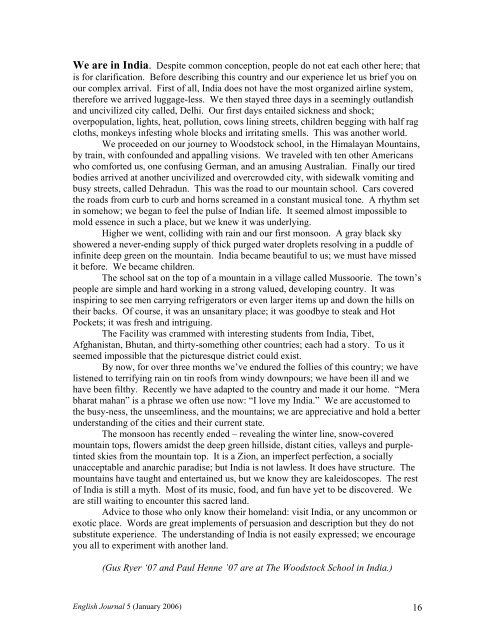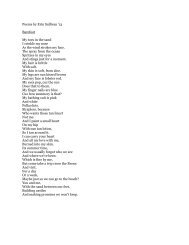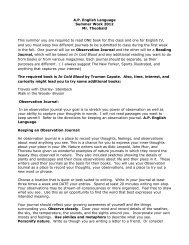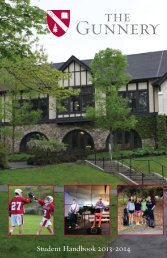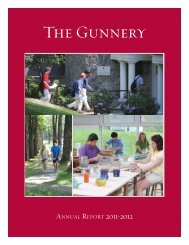You also want an ePaper? Increase the reach of your titles
YUMPU automatically turns print PDFs into web optimized ePapers that Google loves.
We are in India. Despite common conception, people do not eat each other here; thatis for clarification. Before describing this country and our experience let us brief you onour complex arrival. First of all, India does not have the most organized airline system,therefore we arrived luggage-less. We then stayed three days in a seemingly outlandishand uncivilized city called, Delhi. Our first days entailed sickness and shock;overpopulation, lights, heat, pollution, cows lining streets, children begging with half ragcloths, monkeys infesting whole blocks and irritating smells. This was another world.We proceeded on our journey to Woodstock school, in the Himalayan Mountains,by train, with confounded and appalling visions. We traveled with ten other Americanswho comforted us, one confusing German, and an amusing Australian. Finally our tiredbodies arrived at another uncivilized and overcrowded city, with sidewalk vomiting andbusy streets, called Dehradun. This was the road to our mountain school. Cars coveredthe roads from curb to curb and horns screamed in a constant musical tone. A rhythm setin somehow; we began to feel the pulse of Indian life. It seemed almost impossible tomold essence in such a place, but we knew it was underlying.Higher we went, colliding with rain and our first monsoon. A gray black skyshowered a never-ending supply of thick purged water droplets resolving in a puddle ofinfinite deep green on the mountain. India became beautiful to us; we must have missedit before. We became children.<strong>The</strong> school sat on the top of a mountain in a village called Mussoorie. <strong>The</strong> town’speople are simple and hard working in a strong valued, developing country. It wasinspiring to see men carrying refrigerators or even larger items up and down the hills ontheir backs. Of course, it was an unsanitary place; it was goodbye to steak and HotPockets; it was fresh and intriguing.<strong>The</strong> Facility was crammed with interesting students from India, Tibet,Afghanistan, Bhutan, and thirty-something other countries; each had a story. To us itseemed impossible that the picturesque district could exist.By now, for over three months we’ve endured the follies of this country; we havelistened to terrifying rain on tin roofs from windy downpours; we have been ill and wehave been filthy. Recently we have adapted to the country and made it our home. “Merabharat mahan” is a phrase we often use now: “I love my India.” We are accustomed tothe busy-ness, the unseemliness, and the mountains; we are appreciative and hold a betterunderstanding of the cities and their current state.<strong>The</strong> monsoon has recently ended – revealing the winter line, snow-coveredmountain tops, flowers amidst the deep green hillside, distant cities, valleys and purpletintedskies from the mountain top. It is a Zion, an imperfect perfection, a sociallyunacceptable and anarchic paradise; but India is not lawless. It does have structure. <strong>The</strong>mountains have taught and entertained us, but we know they are kaleidoscopes. <strong>The</strong> restof India is still a myth. Most of its music, food, and fun have yet to be discovered. Weare still waiting to encounter this sacred land.Advice to those who only know their homeland: visit India, or any uncommon orexotic place. Words are great implements of persuasion and description but they do notsubstitute experience. <strong>The</strong> understanding of India is not easily expressed; we encourageyou all to experiment with another land.(Gus Ryer ‘07 and Paul Henne ’07 are at <strong>The</strong> Woodstock School in India.)English Journal 5 (January 20<strong>06</strong>) 16


